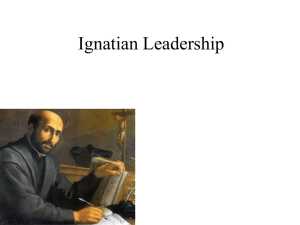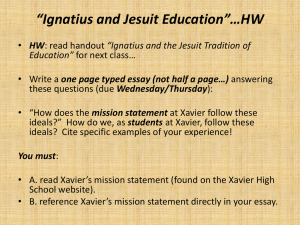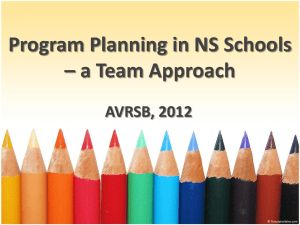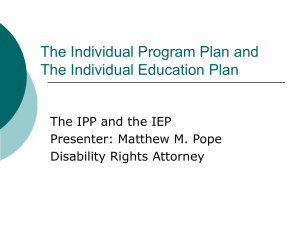Ignatian Pedagogy As a Model for Advising Student Leaders
advertisement
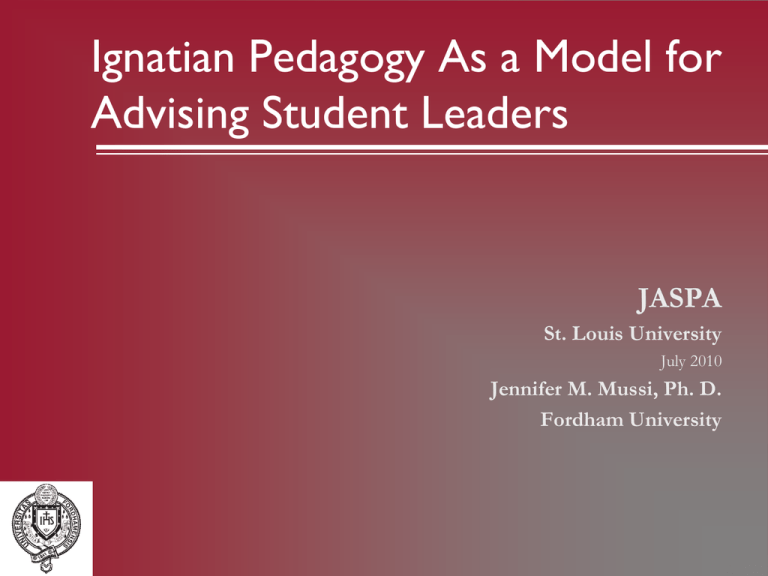
Ignatian Pedagogy As a Model for Advising Student Leaders JASPA St. Louis University July 2010 Jennifer M. Mussi, Ph. D. Fordham University Greetings from the Bronx: Home of Fordham University and the 27-Time World Champion New York Yankees Learning Outcomes • With so many options, why did you pick this session? Learning Outcomes During this session, participants will learn about the Ignatian Pedagogical model of teaching that fosters an environment of experience, reflection and action. Session participants will come away from today’s program with: • A greater understanding of the Ignatian Pedagogical Model • An understanding of how the model can be used by Student Affairs administrators in mentoring and advising student leaders, resident assistants • Resources for building opportunities to use the IPP in Student Affairs • Resources for continued learning about the IPP What is Ignatian Pedagogy? • Understood in the light of the Spiritual Exercises of St. Ignatius, the IPP is the continual interplay of experience, reflection and action in the teaching-learning process • An ideal portrayal of the dynamic interrelationship of teacher and learner in the student’s journey of growth in knowledge and freedom Ignatian Pedagogy: A Practical Approach, Duminuco, S.J. History Lesson: Putting the IPP into Context The Classic Texts of the Society of Jesus: • The Spiritual Exercises • The Ratio Studiorum of 1599 The Contemporary Texts of the Society of Jesus: • The Characteristics of Jesuit Education • Ignatian Pedagogy: A Practical Approach The Spiritual Exercises Through the Spiritual Exercises, Ignatius designed an experience where a spiritual director leads a retreatant on a journey towards God. The relationship between the Spiritual Director and the Retreatant is central to the Exercises. Teaching and learning through the lens of Ignatian Spirituality Using the Spiritual Exercises as a model, Ignatian pedagogy uses the teacher to lead a learner on a journey towards the Truth. The teacher creates the conditions, lays the foundations and provides the opportunities for the continual interplay of the student’s experience, reflection and action to occur. Ignatian Pedagogy: A Practical Approach, Duminuco, S.J. The Ratio Studiorum of 1599 A “rule book” of sorts used to codify major elements of Jesuit education at a time of great expansion of Jesuit education. Written at a time when members of the Society of Jesus were running the schools themselves. Less of an emphasis on “mission” and “vision” of Jesuit education, but how to run a school, discipline a student, the progression of a student’s immersion in the curriculum. Much of the curriculum in the first Jesuit schools compose our modern core curriculum. Today it would be impossible to have a universal curriculum, but the IPP can help us ensure the spirit of Jesuit education lives on. The Characteristics of Jesuit Education The Spiritual Characteristics of Jesuit Education as presented in the 1986 document by ICAJE 1. Jesuit Education is world-affirming. 2. Jesuit Education assists in the total formation of each individual within the human community. 3. Jesuit Education includes a religious dimension that permeates the entire education. 4. Jesuit Education is an apostolic instrument. 5. Jesuit Education promotes dialogue between faith and culture. 6. Jesuit Education insists on individual care and concern for each person. 7. Jesuit Education emphasizes activity on the part of the student in the learning process. 8. Jesuit Education encourages life-long openness to growth. 9. Jesuit Education is value-oriented. 10. Jesuit Education encourages a realistic knowledge, love, and acceptance of self. 11. Jesuit Education provides a realistic knowledge of the world in which we live. 12. Jesuit Education proposes Christ as the model of human life. 13. Jesuit Education provides adequate pastoral care. 14. Jesuit Education celebrates faith in personal and community prayer, worship, and service. The Characteristics of Jesuit Education 15. Jesuit Education is preparation for active life and commitment. 16. Jesuit Education serves the faith that does justice. 17. Jesuit education seeks to form men and women for others. 18. Jesuit education manifests a particular concern for the poor. 19. Jesuit Education is an apostolic instrument, in service of the church as it serves human society. 20. Jesuit education prepares students for active participation in the church and the local community, for the service of others. 21. Jesuit education pursues excellence in its work of formation. 22. Jesuit education witnesses to excellence. 23. Jesuit Education stresses lay-Jesuit collaboration. 24. Jesuit Education relies on a spirit of community among: teaching staff and administrators; people chosen to join the educational community; the Jesuit community; governing boards; parents; students; former students and benefactors. 25. Jesuit Education takes place within a structure that promotes community. 26. Jesuit Education adapts means and methods in order to achieve its purpose most effectively. 27. Jesuit Education is a .system. of schools with a common vision and common goals. 28. Jesuit Education assists in providing the professional training and ongoing formation that is needed, especially for teachers. Ignatian Pedagogy: A Practical Approach, Duminuco, S.J. What is Ignatian Pedagogy? • An Ignatian paradigm of experience, reflection and action suggests a host of ways in which teachers might accompany their students in order to facilitate learning and growth through encounters with truth and explorations of human meaning. • It is a paradigm that can provide an effective response to critical educational issues facing us today, applying theory to the practice of helping students learn. • The model is a fresh yet familiar Ignatian paradigm of Jesuit education, a way of proceeding which all of us can confidently follow in our efforts to help students truly grow as persons of competence, conscience and compassion. Ignatian Pedagogy: A Practical Approach, Duminuco, S.J. How can Ignatian pedagogy help us as advisors? • Pedagogy is the way in which teachers accompany learners in their growth and development. • Pedagogy, the art and science of teaching, cannot simply be reduced to methodology. It must include a world view and a vision of the ideal human person to be educated. • Ignatian Pedagogy assumes the Jesuit worldview and moves one step beyond suggesting more explicit ways in which Ignatian values can be incarnated in the teaching-learning process. Ignatian Pedagogy: A Practical Approach, Duminuco, S.J. Sounds good, but … • How does this apply to my work as a Student Affairs administrator? What does “advisor” mean to you? •For you: •For me: an advisor is an educator. Let me tell you a story … •According to Webster’s New Collegiate Dictionary, an advisor is a person who gives advice or makes a recommendation as to a decision or course of action. Your Experience: What are the blessings of being an advisor? Your Experience: What are the challenges of being an advisor? Remember your early interactions with an advisor/mentor • What made that relationship special? • How can you apply that to your role as an advisor and how do you need to advise differently for today’s students? • When have you been that person for one of your student advisees? Advising within the big picture of student affairs administration Today’s student affairs administrator is expected to: educate, lead and manage Leader Manager Educator “The Professional Student Affairs Administrator,” Winston, Creamer, Miller and associates Behavioral characteristics of educators, leaders and managers Educators: • Lecturing • Demonstrating • Advising • Coaching • Modeling • Facilitating • Learning • Researching • Evaluating • Collaborating • Structuring Leaders: •Supervising •Planning and organization •Decision making •Monitoring indicators •Controlling •Representing •Coordinating •Consulting •Administering Managers: •Planning and organizing •Problem solving •Clarifying roles and objectives •Informing •Monitoring •Motivating and inspiring •Consulting •Delegating •Supporting •Developing and mentoring •Managing conflict and team building •Networking •Recognizing •Rewarding “The Professional Student Affairs Administrator,” Winston, Creamer, Miller and associates With all that … • Who has time for advising? • Advising is complicated. • Advising is incredibly important and at the core of what we do. Getting Ignatian about advising • What can St. Ignatius teach us about advising? Ignatian Pedagogy: 5 elements • Context • Experience • Reflection • Action • Evaluation The Dynamics of the Paradigm Context of Learning: Before Ignatius would begin to direct a person in the Spiritual Exercises, he always wanted to know about their predispositions to prayer, to God. He realized how important it was for a person to be open to the movements of the Spirit. In the Spiritual Exercises, Ignatius makes the point that the experiences of the retreatant should always give context to the exercises that are being used. Educators should take account of: 1. The real context of a student’s life 2. The socio-economic, political and cultural context 3. The institutional environment of the school or learning center 4. What previously acquired concepts students bring with them to the start of the learning process Ignatian Pedagogy: A Practical Approach, Duminuco, S.J. The Dynamics of the Paradigm Experience: Experience for Ignatius meant “to taste something internally.” • • • We can use “experience” to describe any activity in which in addition to a cognitive grasp of the matter being considered, some sensation of an affective nature is registered by the student. Human experience can be either direct or vicarious (reading, listening or lecture). What is this? How do I react to it? Ignatian Pedagogy: A Practical Approach, Duminuco, S.J. The Dynamics of the Paradigm Reflection Throughout his life, Ignatius knew himself to be constantly subjected to different stirrings, invitations, alternatives which were often contradictory. His greatest effort was to try to discover what moved him in each situation. DISCERNMENT – clarification of internal motivation Ignatian Pedagogy: A Practical Approach, Duminuco, S.J. The Dynamics of the Paradigm Reflection • A thoughtful reconsideration of some subject matter, experience, idea, purpose or spontaneous reaction, in order to grasp its significance more fully • Reflection is the process by which meaning surfaces in human experience: – – – – – By understanding the truth being studied more clearly By understanding the sources of the sensations or reactions I experience By deepening my understanding of the implications of what I have grasped for myself and for others By achieving personal insights into events, ideas, truth or the distortion of truth By coming to understanding of who I am (what moves me and why) and who I might be in relation to others Ignatian Pedagogy: A Practical Approach, Duminuco, S.J. The Dynamics of the Paradigm Action For Ignatius, the acid test of life is what one does, not what one says. “Love is shown in deeds, not words.” The thrust of the Spiritual Exercises was precisely to enable the retreatant to know the will of God and to do it freely. Ignatius and the first Jesuits were most concerned with the formation of students’ attitudes, values, and ideals according to which they would make decisions in a wide variety of situations about what actions were to be done. Ignatius wanted Jesuit schools to form young people who could (and would) contribute intelligently and effectively to the welfare of society. Ignatian Pedagogy: A Practical Approach, Duminuco, S.J. The Dynamics of the Paradigm Action • • • • Reflection in IP would be a truncated process if it ended with understanding and affective reactions. Ignatian reflection, just as it begins with the reality of experience, necessarily ends with that same reality in order to effect it. Reflection only develops and matures when it fosters decision and commitment. Ignatius strives to encourage decision and commitment for the MAGIS, the better service of God and our sisters and brothers. Ignatian Pedagogy: A Practical Approach, Duminuco, S.J. The Dynamics of the Paradigm Action The term “action” refers to internal human growth based upon experiences that has been reflected upon as well as its manifestation internally. It involves two steps: • • Interiorized choices – the will is moved Choices externally manifested – calls the student to action: to do something consistent with this new conviction Ignatian Pedagogy: A Practical Approach, Duminuco, S.J. The Dynamics of the Paradigm Evaluation • • • Not just evaluation in the typical sense. IP aims at formation which includes, but goes beyond academic mastery. It is concerned with students’ well-rounded growth as persons for others. Periodic evaluation of the students’ growth in attitudes, priorities and actions consistent with being a person for others is essential to IPP. Ignatian Pedagogy: A Practical Approach, Duminuco, S.J. IPP in Practice: The continual interplay of experience, reflection and action ACTION REFLECTION EXPERIENCE Ignatian Pedagogy: A Practical Approach, Duminuco, S.J. Ways the IPP can be used in student leadership advising: • In a time of strategic planning and program assessment, have we examined our existing programs and services through the lens of IPP? • A Call For Action Ways the IPP can be used in student leadership advising: • Provide your students with context, experience, reflection, action and evaluation in everything that you do. Ways the IPP can be used in student leadership advising: • Use IPP to strengthen Student Affairs instructional techniques. – Many of us are not classroom teachers, but the IPP can help us strengthen our delivery methods and provide a template for creating our out-of-the classroom learning. Ways the IPP can be used in student leadership advising: • Use the IPP in the design of your leadership development model both in broad stroke and in individual learning opportunities. – Consider the four-year experience your students will have with your program/department and carve our experiences based on the five-steps of the IPP. – Use the IPP to creating a rubric for how you will approach your leadership development initiatives – requiring that each workshop or activity consider the framework of the IPP within its learning outcomes. Ways the IPP can be used in student leadership advising: • Utilize the five-steps in your ongoing advising meetings with student organization leaders, RAs, Orientation Leaders, etc. • The Examen • Ongoing journaling (both student and advisor) Ways the IPP can be used in student leadership advising: • The IPP reminds us that as educators we accompany our students on their journey. • Utilize the IPP in our own professional development. • Utilize the IPP in supervision. IPP In Action: • Fordham University First Year Formation Ways the IPP can be used in student leadership advising: • Your ideas and ways of using the IPP: Ways the IPP can be used in student leadership advising: • Challenges to implementation: Functional Area Break-Outs: • Student Activities Advisors: How can you utilize the IPP in your ongoing advising of student government leaders? • Orientation Advisors: How can you utilize the IPP in the first-year experience? • Residential Life Advisors: How can you use the IPP in building an RA training program and ongoing supervision of RAs? • General Student Affairs: How can the IPP be used in supervising Student Affairs staff? (parttime/full-time) IPP Resources for Advisors: • The Jesuit Secondary Education Association website • The full text of The Characteristics of Jesuit Education and Ignatian Pedagogy: A Practical Approach (widely available online and in The Jesuit Ratio Studiorum 400th Anniversary Perspectives edited by Rev. Vincent J. Duminuco, S.J. • Fordham University Dissertation by Joseph DeFeo of Fairfield University Thank you! Contact Information: Jennifer Mussi, Ph. D. Assistant to the Vice President for University Mission and Ministry Fordham University mussi@fordham.edu 718.817.3012


